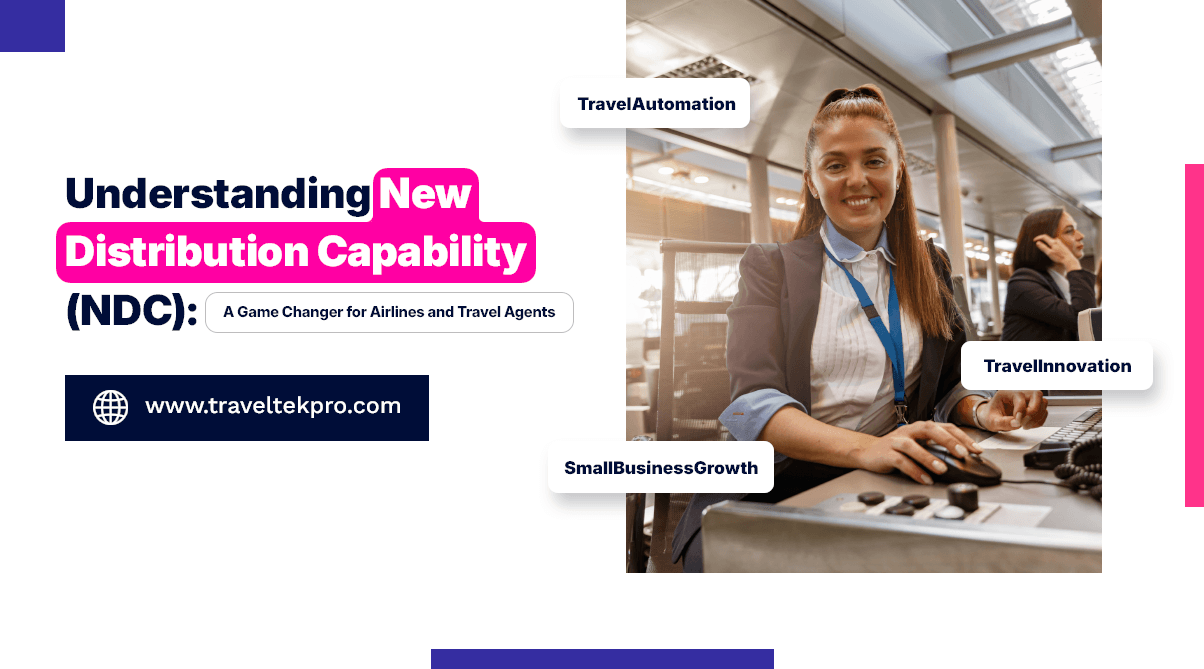Why Travel Agents Need Flight Booking Software in 2025
Travel is booming again in 2025 and more people are turning to travel agents like you to help them find the best deals and experiences. But with the rising competition and fast changing technology travel agents like you need Smart Tools to stay ahead. That’s where the airline reservation system truly comes into the picture. If you are a travel agent you might be wondering, do you really need software to book flights? The answer is a big yes. In this guide you can learn everything about why you should consider choosing flight booking software.
The Changing Landscape of Flight Bookings
Years ago most of the travel agents called airlines or used basic systems to book flights. But things have changed fast. Today your customers expect instant flight options, mobile friendly bookings and detailed travel information. In 2025 there are more budget airlines, flexible fare options, dynamic pricing models and of course global customer bookings across time zones. To manage all this your traditional system just doesn’t cut it anymore. That’s where a modern airline reservation system makes life easy and business better.
What is Flight Booking Software?
Before you invest in a flight booking software for travel agents it’s very important for you to understand the basics. It is actually a tool designed for travel agents like you to search books and manage flight tickets effectively. It connects with global airline systems through global distribution systems like Sabre. The systems allow you to access real time flight availability and compare prices from different airlines. You can also book multi stop trips with ease. At the same time the system makes handling PNR easy and also you can generate invoices and itineraries. The best of all is that you can easily handle cancellations and changes. In short you can see that it’s a one stop travel solution for flights all in a few clicks.
Top 7 Reasons Travel Agents Need Flight Booking Software in 2025
1. Faster bookings
Time is really money. Your clients want instant responses. With modern flight booking software you can easily check flight prices and book tickets in seconds. There is no need for you to call airlines or switch between multiple websites.
2. Real time airline integration
The systems connect directly to the airlines reservations systems so you can just get live information. This means there are no updated schedules or incorrect prices.
3. Smart price comparisons
With hundreds of flights available today, comparing prices manually is challenging. A good flight booking engine shows side-by-side fare comparisons. You can just offer the best deals with the right comparing tool.
4. Earn higher commissions
There are different flight booking software for travel agents today that offer inbuilt Commission tracking and markup tools. You can just control pricing and earn better profits.
5. 24/7 availability
Most of the platforms today Are completely cloud based. It means that you can access them from your phone, laptop , or tablet anytime, anywhere.
6. Reduce errors and save time
Because the risk of errors like wrong date or passenger names. The software can help you automate all the steps reducing costly mistakes.
7. Handle complex itineraries easily
Do you need to book a multi-city or a group trip? No problem. A good system makes it very easy for you to handle even the most complex bookings without breaking a sweat.
New Capabilities in 2025 Flight Booking Tools
The latest flight booking software in 2025 is truly smarter than ever before. Some of the main upgrades generally include AI based fare prediction. You can see when flight prices might just go up or down. Voice activated search makes it easy for you. you speak your request instead of just typing it. Customized travel offers are available and you can give the prices based on the client history and preferences. Integrated chat support makes it very easy for you to help your customers in real time. Automated invoicing and CRM tools will make it easy for you to keep a track of your customers and payments easily. In short you can say that these features can save you a lot of time and also help you deliver a premium experience to all your clients.
Comparison: Manual Workflow vs Flight Booking Software
| Feature | Manual Booking | Flight Booking Software |
| Flight Search | Slow, limited options | Instant, global access |
| Error Rate | High | Low (Automated validation) |
| Price Comparison | Manual, time-consuming | Real-time, side-by-side |
| Speed | Takes hours | Done in minutes |
| Availability | Office hours only | 24/7 access |
| Data Storage | Paper/Excel | Cloud-based system |
The comparison makes it clear that switching to a smart airline reservation system makes your job really easy and helps your business grow faster.
Flight Booking Software Use Cases for Different Types of Travel Agents
Independent travel agents
If you work solo software gives you the power to compete with big agencies. You can offer better prices, manage bookings and grow your client list all from your laptop.
Corporate travel agencies
Do you handle multiple business clients? Use the software to track corporate bookings, apply loyalty programs and generate detailed invoices quickly.
Online travel agencies
Online travel agencies just rely on flight booking engines to deliver instant flight results on the website. The software automates everything from search to payment.
Group and event travel planners
Booking for weddings, school trips or corporate retreats? The software will make it very easy for you to manage bulk bookings, block seats and coordinate passenger information easily.
Common Myths About Flight Booking Software – Debunked
It’s too expensive
It’s not true a lot of providers offer flexible plans based on your business size. Some even offer free trials as pay as you go options.
I can do everything manually
Maybe you can manage everything manually but you’ll spend a lot of time and risk making more mistakes. So let the software do the heavy lifting for you.
It’s only for big agencies
Nope, even solo agents can benefit from flight booking software for travel agents. It levels the playing field undoubtedly.
How to Choose the Right Flight Booking Software in 2025
There are different options out there. But you need to understand if the software is very easy to massage books and manage flights. Does it connect with global GDS? Do they offer support service or onboarding help? Can you adjust pricing branding or reports with the software? Also you need to check the customer reviews and ask for demos. A good travel software development company will truly help you tailor the system to your own requirements.
So above all in 2025 being a successful travel agent means being fast, smarter and also customer focused. You need tools that help you book flights quickly, reduce errors and also offer better prices for stuff that’s exactly what a flight booking software does. It’s way more than just a tool, it’s your ticket to work smarter and earn more.
FAQs:
1. What is flight booking software?
Flight booking software is a comprehensive digital solution that enables travel agents to search, compare, book, and manage flight tickets from multiple airlines through a single interface. Modern flight booking solutions integrate powerful APIs and AI algorithms to access real-time inventory across global distribution systems (GDSs), providing instant access to flight schedules, fares, and availability. These tools streamline the booking process, eliminate manual errors, and enable agents to deliver faster, more accurate service to their clients. Advanced systems also offer back-office automation, reporting capabilities, and integration with other travel services like hotels and car rentals for complete travel management.
2. Is flight booking software only for large agencies?
Absolutely not. Flight booking software is designed to benefit travel businesses of all sizes, from independent agents to small teams and large enterprises. Cloud-based solutions have made sophisticated booking technology accessible to smaller agencies by eliminating the need for expensive hardware investments and IT infrastructure. According to industry reports, small and medium travel businesses can particularly benefit from these systems through streamlined operations, reduced administrative costs, and expanded distribution capabilities. Many providers offer scalable solutions that can grow alongside your business, making them ideal for startups and established agencies alike.
3. How much does it cost?
The cost of flight booking software varies widely depending on the provider, features offered, and pricing structure. Some companies charge a monthly or annual subscription fee that grants access to the platform with a set of included features, while others operate on a transaction-based model where you pay per booking made. There are also hybrid models combining both subscription and per-booking fees. Additionally, many providers offer free trials or demo versions so agencies can evaluate the software before committing financially. When considering cost, it’s important to factor in not only the license or subscription fees but also potential savings from increased efficiency and revenue growth enabled by the software.
4. What are the key benefits of using flight booking software in 2025?
Using flight booking software in 2025 offers travel agents significant advantages that go beyond simple ticket reservations. The software automates complex and time-consuming tasks, allowing agents to handle more bookings with greater accuracy and speed. It enables 24/7 booking capabilities, which means agencies can generate revenue even outside traditional business hours through online portals. Customers benefit from personalized flight recommendations and real-time updates, enhancing their overall travel experience. Furthermore, these platforms expand an agency’s distribution reach by connecting to multiple sales channels and markets. The data analytics embedded in modern software also provide valuable insights into booking trends and customer preferences, empowering agencies to make smarter business decisions while reducing operational costs.
5. How is AI transforming flight booking software in 2025?
Artificial intelligence has dramatically transformed flight booking software, making it smarter and more responsive to both agents’ and travelers’ needs. AI algorithms analyze vast amounts of data to deliver highly personalized flight options based on individual preferences and past behaviors. Machine learning models predict fare fluctuations, helping agents advise clients on the best time to book for optimal pricing. AI-powered chatbots and virtual assistants can handle complex booking inquiries and customer service tasks, freeing agents to focus on higher-value activities. Additionally, AI enhances security by detecting fraudulent booking attempts and suspicious activities in real time. These advancements enable travel agents to provide faster, more accurate, and highly customized service in an increasingly competitive marketplace.
6. What security considerations should travel agents have when using booking software?
Security is a critical concern when using flight booking software, as these systems handle sensitive passenger information and payment data. Many booking platforms still rely on legacy infrastructure initially designed before the internet era, which can expose vulnerabilities such as weak authentication methods and susceptibility to brute force attacks. Travel agents should prioritize software providers that implement strong security measures including multi-factor authentication, end-to-end encryption, and regular security audits. Compliance with global data protection regulations like GDPR is essential to safeguard customer privacy. Agencies should also establish internal security protocols and train staff to recognize and prevent potential cyber threats. Choosing a secure flight booking system protects both the agency’s reputation and its clients’ sensitive information.
It is actually a tool that helps travel agents like you search books and manage flight tickets from multiple airlines.
Even independent agents or small teams can benefit from it.
Prices are likely to vary depending on the features. Some systems charge monthly, while others charge per booking. Free trials are also available.




